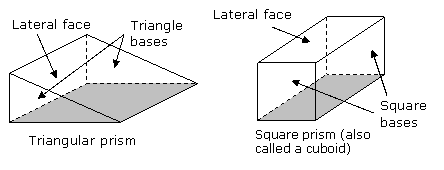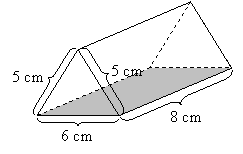Volume of Prisms
Solid geometry is concerned with three-dimensional shapes. In these lessons, we will learn
- what is a prism?
- how to find the volume of prisms.
- how to solve word problems about prisms.
Related Pages
Volume Formula
Volume Of Prism Worksheet
Volume Formulas Explained
More Geometry Lessons
Prisms
A prism is a solid that has two parallel faces which are congruent polygons at both ends. These faces form the bases of the prism. A prism is named after the shape of its base.
The other faces are in the shape of parallelograms. They are called lateral faces.
The following diagrams show a triangular prism and a rectangular prism. 
A right prism is a prism that has its bases perpendicular to its lateral surfaces. If the bases are not perpendicular to its lateral bases then it is called an oblique prism.
When we cut a prism parallel to the base, we get a cross section of a prism. The cross section has the same size and shape as the base.
Example:

What is a prism and distinguishes between a right prism and an oblique prism?
How to label the parts of a prism and how to distinguish between an oblique and a right prism?
Volume of a Prism
The volume of a right prism is given by the formula:
Volume = Area of base × height = Ah

where A is the area of the base and h is the height or length of the prism.
Worksheet to calculate volume of prisms and pyramids.
Example:
Find the volume of the following right prism.

Solution:
Volume = Ah
= 25 cm2 × 9 cm
= 225 cm3
Example:
Find the volume of the following right prism

Solution:
First, we need to calculate the area of the triangular base.

We would need to use Pythagorean theorem to calculate the height of the triangle.
h2 + 32 = 52
Area of triangle = ![]()
= ![]() × 6 × 4
× 6 × 4
= 12 cm2
Volume of prism = Ah
= 12 cm2× 8 cm
= 96 cm3
How to find the volume of a rectangular and a triangular prism?
Step 1: Find the area of the base.
Step 2: Multiply the area of the base times the height.
How to find the volume of any prism, right or oblique using a general formula?
Word problems about volume of prisms
The following video shows how to solve a word problem involving the volume of prisms.
Example:
Find the volume and capacity of a swimming pool which is made up of a rectangular and trapezoidal prism.
Use the given net to determine the surface area and volume of a triangular prism
Try out our new and fun Fraction Concoction Game.
Add and subtract fractions to make exciting fraction concoctions following a recipe. There are four levels of difficulty: Easy, medium, hard and insane. Practice the basics of fraction addition and subtraction or challenge yourself with the insane level.

We welcome your feedback, comments and questions about this site or page. Please submit your feedback or enquiries via our Feedback page.